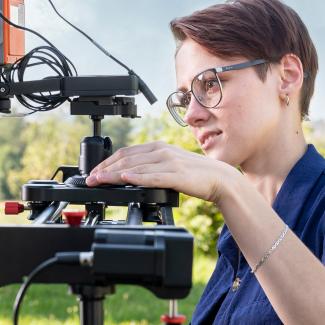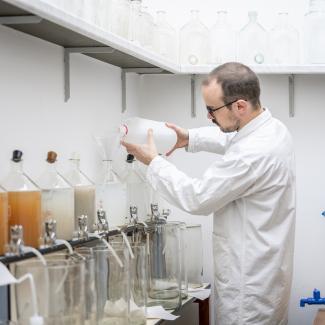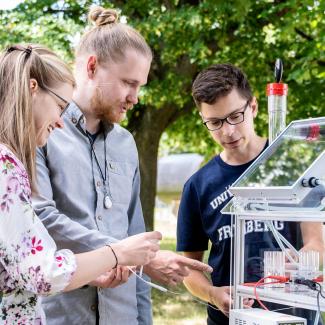Space Resources - Weltraumtechnologien
The focus of the programme is on knowledge of the extreme conditions on other celestial bodies and strategies for using naturally occurring resources there to build and self-sufficiently operate stations (habitats) that enable people and machines to live and work on site. This requires, for example,
- technologies for the exploration, mining and processing of solid and fluid raw materials
- technologies for the production of building materials and construction materials as well as for building
- the provision of life support systems such as breathable air, water, energy and food as well as
- robotic systems and AI.
The degree programme is directly linked to NASA's current ARTEMIS programme to return humans to the moon and establish a permanent presence there.
The degree programme combines the fields of expertise on Earth with the requirements in space. Space technologies can in turn contribute to solving global problems. The degree programme therefore qualifies students for a career in the space industry, e.g. at national and international space agencies, research institutes and space companies, as well as in the shared earthly economy and for founding their own companies.
The scientific background is the experience gained from the application for the large-scale research facility "European Research Institute for Space Resources" (ERIS). With the initiative "Knowledge creates prospects for the region!", the federal government and the Free State of Saxony pursued the goal of supporting structural change in Saxony's coal-mining regions by establishing two new large-scale research facilities. The ERIS project was nominated for the final round. Around 40 scientists from TUBAF were involved in the application together with the "space faculties" at German universities and partner universities in ESA member states, space companies and NASA.
Please note that this is a German-language degree program. At TUBAF we offer a variety of English-language Master's degree programmes.
- Faculty
-
Faculty of Geosciences, Geoengineering and Mining (Faculty 3)
- Degree
-
Bachelor of Science (B. Sc.)
- Standard period of study
-
7 Semester
- Part-time possible
-
Yes
- Start of studies
-
Winter semesterSummer semester
- Admission requirement
-
Baccalaureate or subject-specific higher education entrance qualification or an entrance qualification recognised as equivalent
Language requirement
- Application: with at least B1 level German
- Admission to the degree program: with C1 level German (e.g. DSH-2)
- language courses and DSH exam at TUBAF
- Prep Courses (Studienkolleg)
- Course language
-
German
Graduates are sought-after specialists in the booming aerospace industry. They find career prospects in industry, but also in the scientific field at research institutions and universities.
Employers can be, for example:
- German Aerospace Centre (DLR) with approx. 10.000 employees
- Large companies such as Airbus and OHB in Germany with hundreds of small and medium-sized suppliers (including 40 companies in Saxony)
- Fraunhofer-Gesellschaft and other research institutes
- "New Space" start-up scene
- European Space Agency (ESA), NASA and others

Study programme and content
The duration of the degree programme is 7 semesters, consisting of four semesters of basic studies, two semesters of specialisation, one semester of specialist internship (14 ECTS) and the Bachelor's thesis (12 ECTS).
The basic studies mainly focus on engineering sciences, providing students with a broad basic knowledge. There is at least one specialised module for Space Resources in each semester, e.g. introduction, basics, lecture series, extraterrestrial matter, modelling/simulation, visualisation, planning and others.
Compulsory elective modules totalling 22 ECTS are offered for in-depth study. Further modules totalling 10 ECTS can be freely selected. Subject areas offered include:
- Astro/geo and geoengineering
- Engineering
- Chemistry and materials science
- Robotics, automation and AI
- Law, economics and ethics
Around 30 university lecturers are involved in offering existing foundation modules adapted for the "Space Resources" degree programme. This enables students to be offered the following content, among others:
- Earth, moon, solar system, universe - basics of formation and development
- Structure of the celestial bodies moon and Mars as well as their environmental conditions and natural potentials
- Legal, ethical and economic aspects of the utilisation of space
- Requirements for human presence on other celestial bodies, life support systems (availability of water, breathable air, food, energy, medical care, ....), protection against life-threatening influences (gravity, radiation, temperatures, pressure, micrometeorite hail, ...)
- Requirements and concepts for accommodation/work spaces (habitats), manufacturing and production technologies
- Concepts and requirements for the use of machines under extreme conditions: Materials, modularity, sensor technology, robotics, control, coordination. Requirements: lightweight, energy-efficient, reliable, "indestructible"
- Concepts for the exploration and mining of mineral resources on the moon, Mars and other celestial bodies
- Processing and metallurgical processes under extreme environmental conditions
- Manufacturing of building materials (moulded bricks, ceramics, glass, ...), metals and oxygen from regolith
- Recovery of water and other fluids from water ice
- Construction technologies under extreme conditions (additive manufacturing)
- Out of Earth energy supply and storage systems
- Habitat circular economy
- Transferability of extraterrestrial concepts for habitats to solve problems on Earth
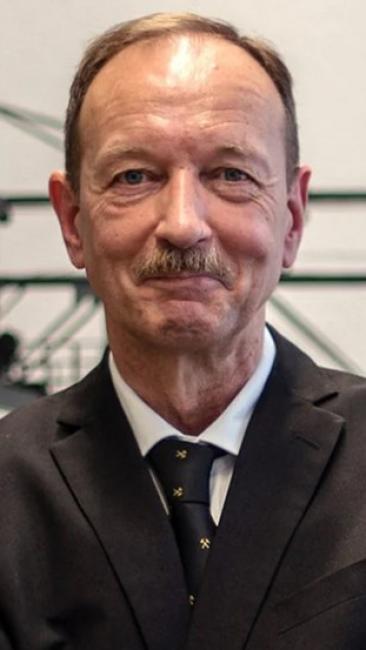
The apparent diversions via space technologies in extreme conditions forces us to be absolutely sustainable and to recycle all resources.
Professor Dr Carsten Drebenstedt, idea generator for the degree programme
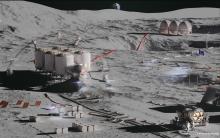
Knowledge transfer
The knowledge and skills are taught by the university lecturers involved, who choose their own teaching and examination methods.
In the engineering sciences, a close connection between science and practice as well as solution-oriented case studies ("problem-based learning", "challenge-based learning", "project-based learning") have a long and profitable tradition. Graduates are not only taught the theoretical basics, but are also trained to become specialists with a pronounced hands-on mentality and a solution-orientated way of thinking.
There are numerous worthwhile aerospace excursion destinations in Saxony and Thuringia, e.g. the space museums. For example, the space museums in Morgenröthe-Rautenkranz and Mittweida as well as research and production centres for space technologies. Visits to the ILA Berlin, the SpaceTechExpo in Bremen and the Space Resource Week in Luxembourg are standard.
In addition, lecture series with renowned scientists and astronauts are planned, similar to the Space Resources lecture series in the summer semester of 2023.
Who is the degree programme ideal for?
- Technology and innovation enthusiasts: If you have a keen interest in the latest technological developments, the degree programme offers you the opportunity to work on pioneering "cutting edge" technologies for space travel and also for use under extreme conditions on Earth. You will have the necessary spirit of research and enjoy solving problems.
- Space enthusiasts: Do you always follow the latest space missions and dream of becoming part of this exciting industry of "space adventure" yourself? With us, you will gain the knowledge and skills to work for leading space organisations and companies.
- Team player: Projects in the aerospace industry usually require many people to work together in interdisciplinary teams to achieve great things. If you appreciate working in groups with like-minded people, like to spur each other on and want to celebrate joint successes, this is the right degree programme for you.
- Multitalents: Are you passionate about engineering, mathematics and physics, but are you also interested in the economic, ethical and legal aspects of aerospace? This degree programme will provide you with an exceptionally broad foundation of knowledge and skills to develop not only innovative, but also economic and sustainable solutions.
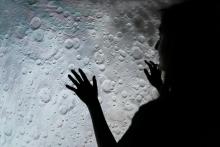
Prospects for a Master's programme
Graduates of the bachelor's degree programme "Space Resources - Space Technologies" will find relevant master's programmes in engineering sciences both at TUBAF and beyond.
There are currently 26 Master's degree programmes in aerospace in Germany, for example
- Space Engineering
- Aerospace Engineering
- ESPACE - Earth Oriented Space Science and Technology
- Electronic Systems in Automotive Engineering, Aerospace
- Aerospace Informatics
- Aeronautical Management
TUBAF is planning to set up its own Master's programme in Habitat Technologies.
